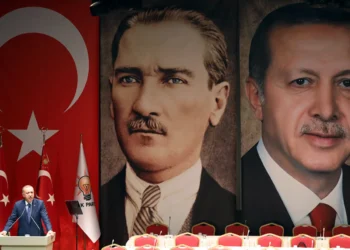BEIJING (Realist English). China will remove the Tibetan language as a core subject in the national college entrance exam (gaokao) for most students in the Tibet Autonomous Region, regional officials have confirmed, drawing sharp criticism from Tibetan exile groups and human rights advocates.
The decision was announced by Gama Cedain, chair of the Tibet Autonomous Region, during a press conference this week. He framed the reform as part of broader efforts to “standardize” national testing and “enhance ethnic minority students’ career prospects” by prioritizing subjects such as Mandarin Chinese, mathematics, and major foreign languages including English, Russian, Japanese, and French.
Tibetan, he said, would be excluded from the core exam lineup but could still be taken by students applying to Tibetan-language-specific programs. “This helps students of all ethnic groups to enjoy fairer access to high-quality education,” Cedain argued, adding that it would “improve their scientific and cultural literacy.”
The change — already communicated verbally to schools and expected to take effect in 2026 — will mean that Tibetan language exams will be limited to a small minority of students, primarily those applying to fields such as Tibetan literature or traditional medicine.
Critics see the move as part of a wider campaign of Sinicisation — the Chinese Communist Party’s effort to assimilate ethnic minorities into Han cultural norms. Dawa Tsering, director of the Tibet Policy Institute in exile in Dharamshala, warned that the reform strips Tibetan of its practical relevance.
“Once you remove Tibetan from the gaokao, it is no longer useful for finding a job or navigating public life,” Tsering said. “This is a calculated step to erase the language from education, business, and administration.”
The Education Ministry and the regional government in Lhasa have not responded to requests for comment. But China’s foreign ministry defended the move, insisting that the state “fully respects the customs and habits of all ethnic groups” and is committed to preserving Tibet’s “excellent traditional culture.”
Under the reform, Tibetan will still be taught in primary and secondary schools in the region and areas with large Tibetan populations. But officials acknowledge that Tibetan language university programs face significant constraints: limited quotas, narrow academic tracks, and weak job placement prospects.
The reform has already led to uncertainty among educators. Several Tibetan language teachers have reportedly been informed that they may be reassigned to non-language teaching positions. Students say they only learned of the change from internal school notices or word of mouth.
“There will be no incentive to learn Tibetan anymore,” said one Tibetan student living outside the region. “This has been like boiling a frog slowly — the pressure just keeps increasing.”
Beijing claims it is promoting equality; critics say it is enforcing conformity. Removing Tibetan from the gaokao narrows not just academic opportunities but the symbolic space where Tibetan identity can persist. The reform underscores a broader trend: in today’s China, cultural difference is increasingly tolerated only if it is apolitical, non-institutional, and ultimately non-essential.


















